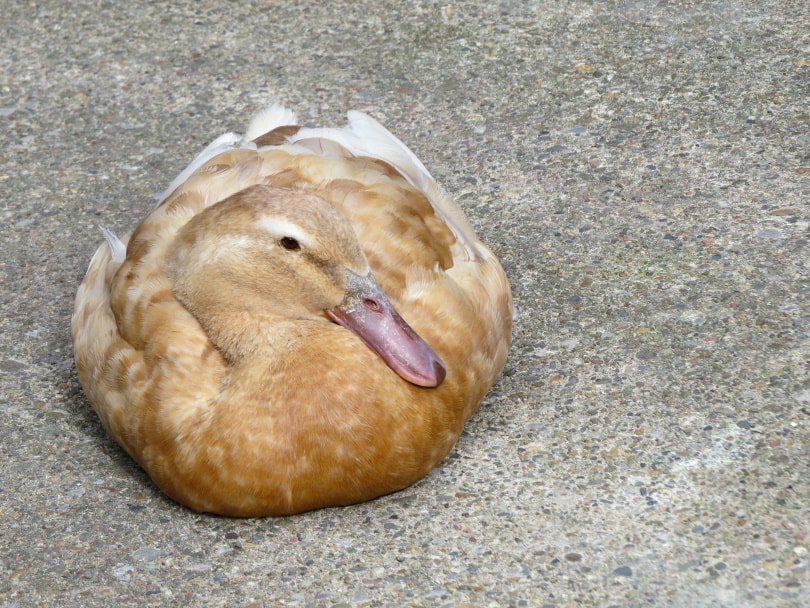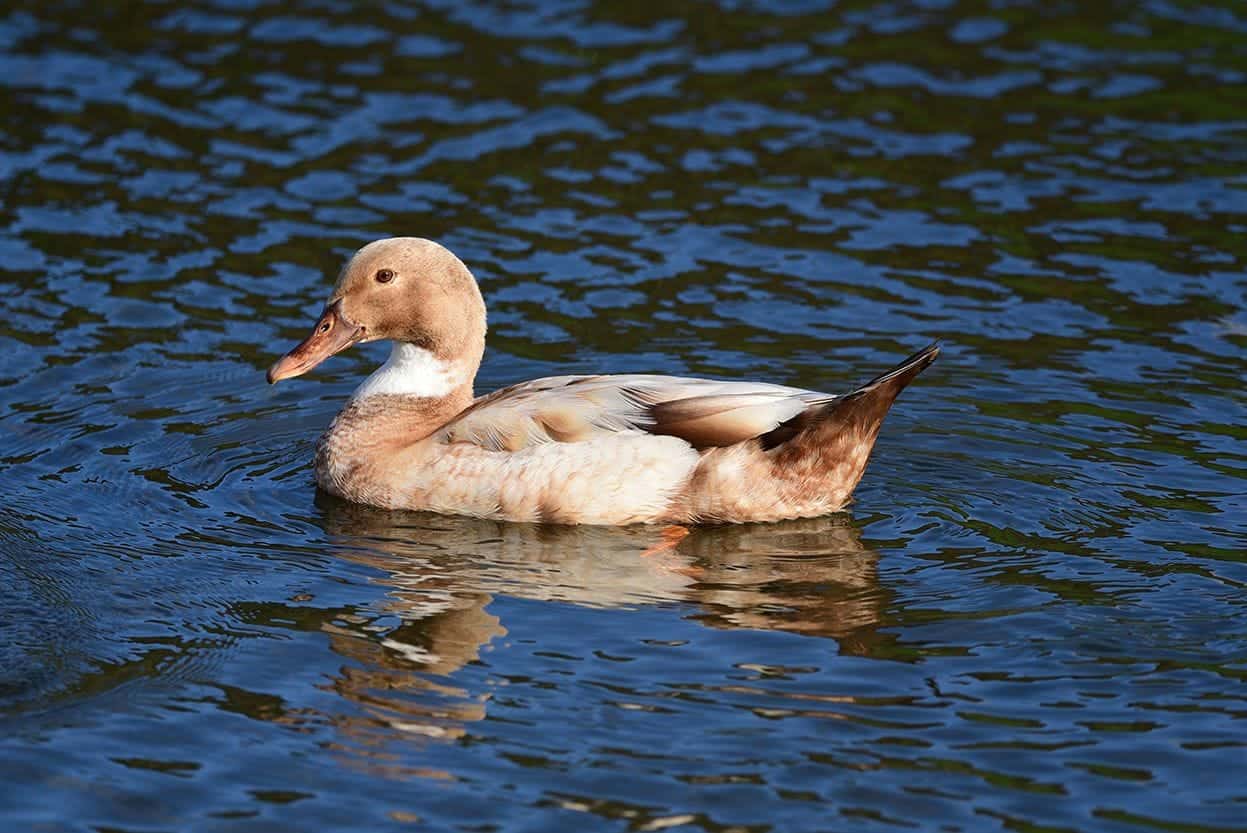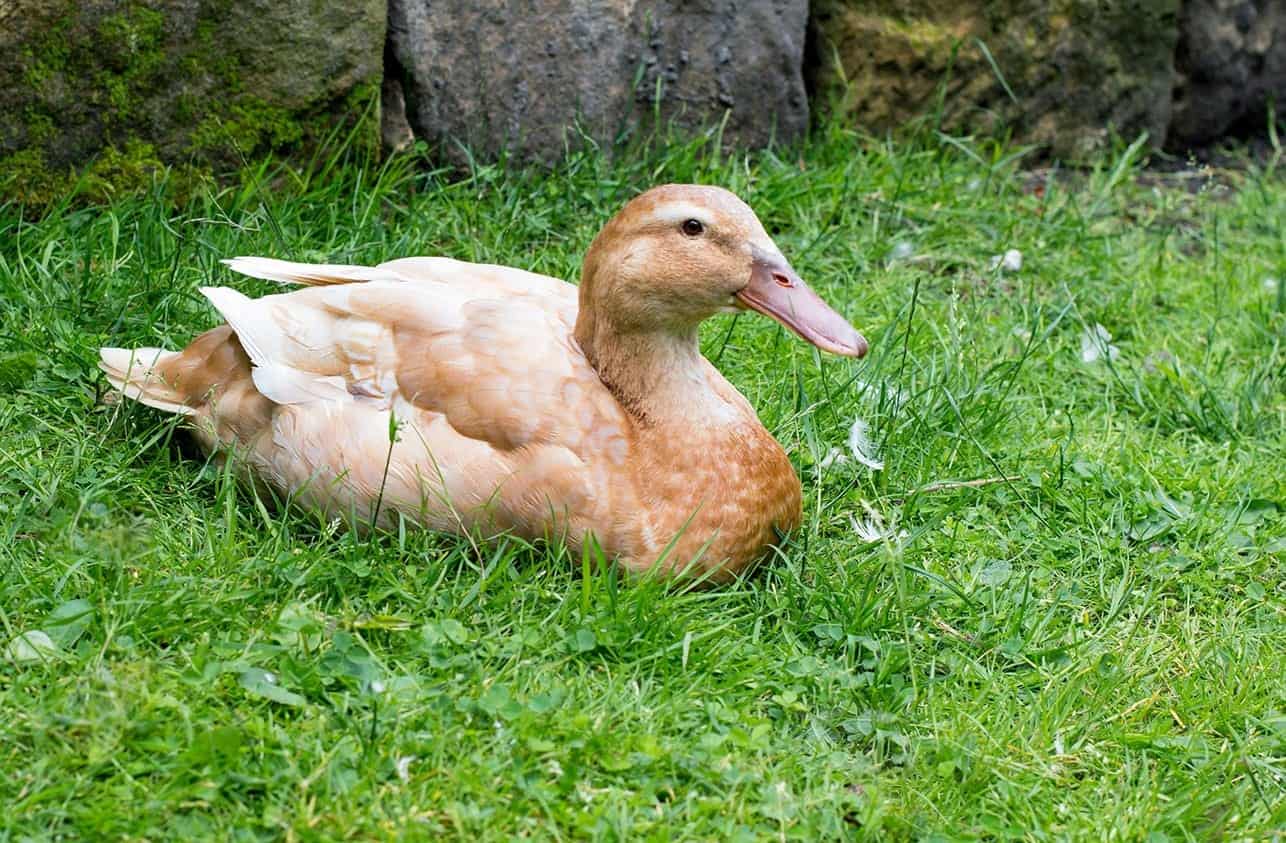Ducks are popular farm animals that can lay free eggs for the breakfast table and bring joy to the household as an interactive pet. There are at least a dozen different types of farm ducks in existence, including the Buff Orpington duck. This duck breed is large, hardy, and easy to care for. Read on to learn about their lifespan, behavior, care needs, and more.

Quick Facts About Buff Orpington Ducks
| Species Name: | Waterfowl |
| Family: | Anatidae |
| Care Level: | Moderate |
| Temperature: | Varied |
| Temperament: | Friendly, intelligent, interactive, pack-mentality |
| Color Form: | Buff body, yellow feet |
| Lifespan: | 8-12 years |
| Size: | 7-8 pounds |
| Diet: | Grains, scratch, worms, bugs, veggies |
| Minimum Coop Size: | 4 square feet |
| Minimum Run Size: | 10 square feet |
| Compatibility: | Moderate |
Buff Orpington Duck Overview

The Buff Orpington duck was developed in the U.K. both for eggs and meat. They made their debut in London in the late 1800s and have since become popular in many other places around the world, including the United States. These are hardy animals that like to show off their intelligence and spend time satisfying their curious nature.
These ducks are friendly and social, making them an excellent pet for families with children. They are not noisy like some other duck breeds are known for being. However, Orpington ducks will alert you if predators or strangers seem to be encroaching on their property. When things are right in their world, they are calm and laidback animals that will simply roam around and explore their surroundings.

How Much Do Buff Orpington Ducks Cost?
Baby chicks can cost between $2 and $10 each, depending on how many you want to purchase at one time. If you want to purchase eggs to hatch at home, they can be slightly more expensive. Adult ducks can cost anywhere between $15 and $40, depending on their egg and meat quality.
Typical Behavior & Temperament
Buff Orpington ducks are lively and curious animals that spend a great deal of their time exploring and foraging for food throughout the day. However, they are quite docile and do not make a big fuss just because people come around. Due to their liveliness, they prefer to free-range in spaces that are protected from potential predators.
These animals can happily live in both cold and warm climates, as their feathers keep them warm and their swimming water keeps them cool when necessary. The males tend to watch closely over their female companions and will keep an eye on the ducklings while exploring too. Believe it or not, the Buff Orpington duck can be trained to stay within boundaries and to head back to their enclosed sleeping quarters when directed to.
Appearance & Varieties

These are medium to large-sized ducks with big heads and long, curved necks. Their tails are short and slightly curly. Their medium-length wings stay close to their bodies most of the time. These ducks are buff in color, but some people refer to them as light brown. They may have white markings but this is not typical.
Their legs and feet are yellow, as is the male duck’s bill. The female’s bill is usually light brown or orange in color. Their small bright eyes portray a sense of alertness and intelligence. These ducks can weigh about 8 pounds as adults.

How to Take Care of Buff Orpington Ducks
These ducks are moderately easy to take care of. They need a protected place to spend their time, an enclosed house to get out of the weather when necessary, a clean source of water to swim and cool off in, and daily fresh food offerings to stay happy and healthy throughout their lives. Here is what else you need to know.
Habitat Conditions & Setup
Buff Orpington ducks can be free-range in a fenced area where they are protected from stray dogs and other possible predators. They should be provided with an enclosed house so they can get out of the weather when things turn bad outside. The interior should offer at least 4 square feet of floor space per bird.
If living in an enclosed habitat, the enclosure should include housing and offer at least 10 square feet of exterior space to roam in. The more space they have, the happier they will be. Their habitat, whether free-range or enclosed, should also include at least a small water tub, swimming pool, or pond. Otherwise, these ducks may overheat during the summer months.

What to Feed Your Buff Orpington Ducks
Ducks eat a wide variety of food in the wild, where they can forage all day long. They may eat small fish, worms, frogs, insects, weeds, algae, seeds, and berries. While they can eat these things in captivity, it can be tough for their human companions to prepare a nutritionally complete meal for them daily using only whole foods.
Instead, owners can opt for a commercial blend of feed that will satisfy this bird’s nutritional needs as time goes on. Any of the foods already listed, as well as lettuce, small amounts of fruit, and leaves, can be offered as snacks. Ducks should have access to gravel or sand so they can eat it when necessary to support their digestion.
Keeping Your Buff Orpington Ducks Healthy
Ducks are susceptible to worms and parasites because they dig around in the ground all day, so they should be treated with a worming medication a couple of times a year. No specific grooming is necessary unless your ducks get extremely muddy, in which case, they should head to the water source for a bath. Making sure that healthy food and fresh drinking water are available daily is also necessary for good health. Also, it never hurts to have a veterinarian come out and check on your birds once a year or so.
Do Buff Orpington Ducks Get Along With Other Pets?
Ducks can get along with any other farm animals around them, but they may not like to be around dogs and other household pets if they seem threatening in any way. The best way to make sure that your Buff Orpington ducks get along with all the animals living on your property is to introduce them to the other animals while they are still babies if possible. The earlier they become accustomed to a certain animal, the easier it will be for them to tolerate the relationship as they age.

Are Buff Orpington Ducks Suitable for You?
Buff Orpington ducks are interesting, hardy animals that can provide you with free food throughout the year and offer you rewarding interactions daily. These animals are smart, curious, friendly, and intelligent. It is a good idea to make a list of pros and cons to refer to when making your final decision.
What is your favorite thing about this cute duck breed? We would love to learn what you think, so feel free to leave a comment for us.
Featured Image Credit: Linda Bestwick, Shutterstock
